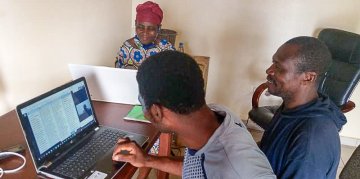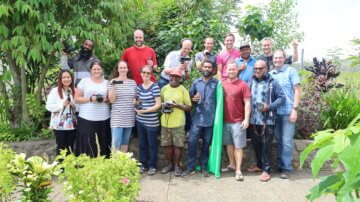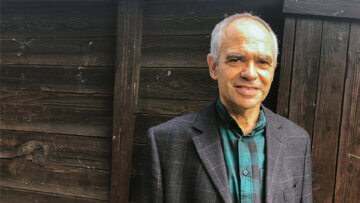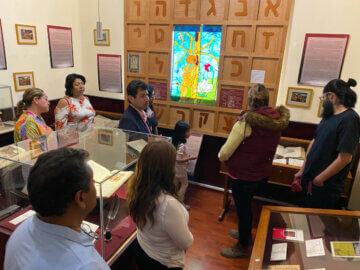Pandemic Prompts Consulting Innovation
In places where Bible translation has always been a face-to-face process, translators and consultants have embraced video calls to check Scriptures during COVID-19.
Meanwhile, a global translation leader even wonders if consultancy itself might be rethought in light of lessons being learned this year.
With travel limited and the world seemingly at an uncertain standstill, organizations like the Cameroonian Association for Bible Translation and Literacy (CABTAL) are learning to live and work amid the pandemic. They have quickly realized that video calls can save time and money.
“I was impressed by the process. I never thought this could happen so well,” said Ervais Fotso, a translation consultant, after completing a checking session using Google Meet.
Franklin Aju, Regional Language Programs Manager for CABTAL, facilitated some of these video sessions.
“Before we began trying this out” he said, “we sent our IT staff to the community to install the necessary programs on translators’ computers and to check internet and power issues.”
Translators and consultants often begin the checking sessions with a video call and end up using just the audio option, to optimize the limited bandwidth.
“We talked more using the audio option, while the team shared their computer window with me, so I could see what they were doing,” Fotso said. “Sometimes, the audio was poor and I sent text messages so we could move forward. We checked like we were in a face-to-face setting. I will lead and the translators will read and the back translator will take over. If I have some questions or points, I will raise them. We will discuss and conclude.”
Lessons Learned
After completing several video checking sessions, the translators of the Tuki project and their consultants saw advantages they had not expected.

Translator Binali Thérèse (back), Translation Coordinator Emile Koroko (front) and Back Translator Eboti Jean Rostand (right) confer during a video checking session in Cameroon.
“It was interesting because I was able to see the team’s computer window,” Fotso said. “This is not normally possible when we check face-to-face. I could see the team make changes and I was more confident with the changes they made. When changes were not well done, I could insist.”
The teams also spent less time on pleasantries and small talk, he added. “This sped up our work.” Yet he also recommends that teams and consultants meet, either online or in person, before the checking process, to get to know each other and head off potential delays later.
Aju, for his part, said his teams have expanded their IT knowledge. He said translators and community leaders were amazed at how technology could help during a crisis.
Fotso also recommended that ParaText software engineers could add a video conferencing feature on the program to facilitate distance checking.
Tuki translators said their work was interrupted a few times due to electricity failures. Heavy rains also resulted in a poor internet connection and delayed the work, they added.
Rethinking Bottlenecks
In other parts of the world, where Internet is more pervasive and reliable, remote consulting has already been used for a while. But, one leader says, the pandemic may cause a broader “reset” in Bible translation strategy.
“Rather than merely looking for ways to use online technologies to do more of what we were already doing, perhaps we have an opportunity to rethink the whole notion of consultancy,” said Bryan Harmelink, the Wycliffe Global Alliance’s Director for Collaboration. “Is it possible that the real bottleneck is not the quantity of available consultants, but the current concept of consultancy as the primary means of quality assurance in translation?
“Perhaps solving the ‘consultant problem’ is not just a matter of training more consultants ‘like us,’ but discovering ways to expand or build greater capacity for quality assurance throughout the whole translation process.”
This could lessen the movement’s dependence on consultants either traveling by plane or connecting remotely via Zoom to check translations, he added.
Remote Challenges
In Papua New Guinea, COVID-19’s impact has been minimal — as of June 16, just eight confirmed cases and no deaths. Virtual consultant checking has not been tried there, but it is being discussed as a future strategy, said Duncan Kaskason, Language Program Manager for the Papua New Guinea Bible Translation Association.
Internet connectivity in PNG villages is poor, Kasokason said. So, if virtual checking is to be introduced in PNG, it would be done by getting the right people from local projects to central locations. Also, he added, every national consultant has different strengths and weaknesses. Not all are suited to, or comfortable with, virtual checking.
He said teams are still willing to try it.
“If it works, then praise God to walk in new ways of doing things.”
Remote checking also adds new dimensions to prayer for a project, said Nancy Morse, a consultant for SIL in Latin America.
“When we can work in person, we only have to pray for the health and safety of all the team and the consultant, wisdom and carefulness as we work, that the computers, monitors and electricity will work,” she said. “It doesn’t matter if the internet doesn’t work, because ParaText files can be passed on a USB from one computer to another. But working remotely, all that needs to be prayed for as well as that the internet will function. If it doesn’t, progress on the consultant check stops.
“Working remotely teaches us to pray more intentionally, specifically and frequently for God’s help and protection over every aspect of the process.”
Saving Time and Travel
Poh San, a veteran translator and consultant from Singapore, has worked in PNG, East Asia and now Southeast Asia. She was scheduled to go to a Southeast Asian country to do checking for the “B” team (pseudonym) in April, but COVID-19 derailed her plans.
“After having used Zoom for communicating with different groups for various purposes, it dawned on me that I could use the same application to conduct checking of translation for the B team,” she said.
In May, during their first virtual team meeting, members connected from three locations: Singapore, the capital of the Southeast Asian country, and the location where most of the team members and checkers are based. After several days of consultation, Poh San called the experience positive.
“People who have not attended previous consulting sessions joined in this time, because they were working in the comfort of their homes,” she said. “The only drawback was when thunderstorms disrupted our connections.”
Whenever that happened, the person in capital city would relay Poh San’s words to the team location, and vice versa.
Other little issues arose. With only one laptop computer, Poh San could not look at her notes, or ParaText, at the same time as the Zoom screen. She had to print her notes and input the changes later. She tried using her cellphone for Zoom, but could not see all participants on one screen view.
Still, she saw enough potential to be optimistic.
“If our consulting sessions could be done via such applications, it will save us much time in travel, and also from the expensive air travel, which will get more expensive after the pandemic,” she said. “An added advantage will be that I will be able to consult for teams in PNG, as long as they are in a location with good internet connections. I could also extend help to teams in other parts of the Asia-Pacific region.”
Looking Ahead
Back in Cameroon, Paul Kimbi speaks hopefully of lessons learned during COVID-19. Kimbi, a Bible translation consultant and member of the Wycliffe Global Alliance Leadership Team, understands the problems of rural internet access and bandwidth, along with human challenges.
“For a consultant session to work well done from a distance,” he said, “it requires that the consultant should have known the team, understand their challenges, their strengths and how they communicate. This eases up communication gaps. But this also depends on the level of understanding of team members.”
Another Cameroonian consultant, who asked that his name not be used, used a video call recently to check Scriptures for the first time.
“I have been stressing a lot to travel through very bad roads to check Scriptures in remote areas,” he said. “To get to some communities, I travel for three days, and I rest for one day before I start working with the teams. When I am done, I spend three other days, traveling home. But with this new novelty, my wife is happy to have her husband around and I don’t have to go through all the stress.
“I will continue with this, even after the COVID 19 pandemic.”
Story: Isaac Genna Forchie in Cameroon; Jim Killam in the U.S.
Assistance from Ling Lam in Asia and Gwendolyn Davies in the U.S.
The latest
View all articles
03/2024 Pacific: Papua New Guinea
Informing, teaching, inspiring: PNG workshop teaches video storytelling for language communities
PNG workshop teaches video storytelling for language communities
Read more
02/2024 Global
Looking ahead at 2024
As the year unfolds, we marvel at the work of God in our rapidly changing world. And, we look forward to a number of gatherings and conversations intended to draw us together.
Read more
01/2024 Americas
Telling the Bible's Story
It may come as a surprise that a museum is among the Wycliffe Global Alliance organisations.
Read more